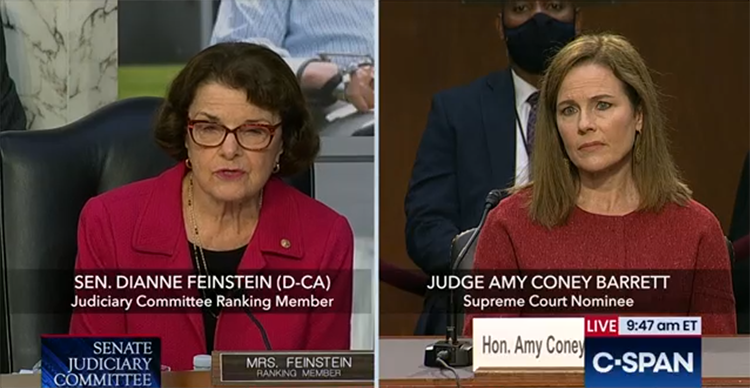Barrett: Racism and discrimination is 'abhorrent'; 'I have never discriminated on the basis of sexual preference'

In response to a question by Sen. Dianne Feinstein, Judge Amy Coney Barrett said, “I have never discriminated on the basis of sexual preference and would not ever discriminate on the basis of sexual preference.” Image from C-SPAN.
Like Supreme Court nominees before her, Judge Amy Coney Barrett refused to talk about how she would rule in pending cases when questioned during the second day of her confirmation hearing on Tuesday.
But when pressed for her personal opinion on racism by Democratic Sen. Dianne Feinstein of California, Barrett provided an answer. “As a person, I have a general belief that racism is abhorrent,” Barrett said.
Barrett gave a similar answer when Feinstein asked her about LGBT discrimination. “Senator, I have no agenda and I want to be clear that I have never discriminated on the basis of sexual preference and would not ever discriminate on the basis of sexual preference,” Barrett said. Like racism, she believes discrimination is “abhorrent,” she said.
Barrett also said the philosophy of Justice Antonin Scalia was her own, but that doesn’t mean she would always rule as Scalia did. Even originalists disagree on outcomes, she said.
“If I am confirmed you would not be getting Justice Scalia, you would be getting Justice Barrett,” she said.
Feinstein also pressed Barrett on the importance of precedent and how she would approach decisions involving abortion and gun rights.
Barrett said she would obey all the rules of stare decisis, and if a question arises about overruling precedent she would look at the required factors, including the reliance interest created by the decision, and whether a precedent had been undermined by later facts and law.
Barrett emphasized that judges don’t consider overruling precedent until presented with a controversy that begins with a challenge to a law.
“Judges cannot just wake up one day and say, ‘I have an agenda, I like guns, I hate guns, I like abortion, I hate abortion,’ and walk in like a royal queen and impose their will on the world,” Barrett said. “You would have to wait for cases and controversy.”
While Barrett did not say how she would rule in Second Amendment cases, she did say that the Supreme Court’s decisions on gun rights allow for some constraints on gun ownership. She pointed to a dissent she wrote in Kanter v. Barr.
According to Barrett’s description of the opinion, Barrett said the original meaning of the Second Amendment supports the idea that governments are free to keep guns out of the hands of dangerous people, such as people with mental illness.
She also said the opinion shows how she will approach legal issues. She looked at the text and history of the Second Amendment, as well as how the court has handled the cases.
Updated on Oct. 14 to correct quote in the ninth paragraph.



